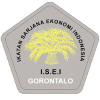Focus And Scope
JAMBURA ECONOMIC EDUCATION JOURNAL (E-ISSN: 2656-4378)(P-ISSN: 2655-5689) is a research base journal published by Faculty of Economics, Universitas Negeri Gorontalo Indonesia. The journal published two times per year in January and July. This journal started publishes since 2019.
The aims of this journal is to provide a venue for academicians, researchers and practitioners for publishing the original research articles or review articles. The scope of the articles published in this journal deal with a broad range of topics, including:
- Teachers : Teachers play a crucial role in shaping society by educating and inspiring the next generation. They're not just conveyors of knowledge; they're mentors, guides, and sometimes even parental figures.
- Learning : Learning is a fundamental process through which organisms acquire new knowledge, behaviors, skills, or attitudes, allowing them to adapt to their environment and improve their chances of survival and success. It's a complex phenomenon that occurs throughout life, involving various cognitive, emotional, and behavioral changes.
- Economic Education : Economic education, also known as economics education or economic literacy, refers to the process of teaching individuals about economic principles, concepts, and theories to enhance their understanding of how economies function and their ability to make informed economic decisions. Economic education encompasses various levels, from basic financial literacy to advanced economic theory, and it is essential for both individuals and societies to navigate economic systems effectively.
- Economics : Economics is the social science that studies how individuals, businesses, governments, and societies allocate scarce resources to satisfy unlimited wants and needs. It encompasses a broad range of topics, from the behavior of individuals and firms to the functioning of entire economies.
- Entrepreneurship : Entrepreneurship is the process of identifying opportunities, marshaling resources, and creating value by launching new ventures or innovating within existing organizations. Entrepreneurs are individuals who possess vision, creativity, and a willingness to take risks in pursuit of their ideas. Entrepreneurship is often associated with starting new businesses, but it also encompasses activities such as introducing new products or services, implementing new processes, or pursuing novel approaches to solving problems.
- Micro Small and Medium Enterprises : Micro, Small, and Medium Enterprises (MSMEs) are businesses that fall within a certain size range in terms of employment, investment, and/or revenue. These enterprises play a crucial role in economic development, job creation, innovation, and poverty alleviation in many countries around the world. The specific criteria for categorizing businesses as MSMEs vary by country.
- Finance : Finance is the study of how individuals, businesses, and governments manage and allocate resources over time, with a focus on making decisions about acquiring, investing, and using money and other financial assets. It encompasses a wide range of activities, including banking, investments, lending, borrowing, budgeting, and financial planning. Finance plays a crucial role in both personal and business decision-making, as well as in the functioning of economies at large.
- Learning Outcomes : Learning outcomes are statements that describe what learners should know, understand, or be able to do after completing a learning experience, such as a course, program, or training activity. Learning outcomes provide a clear and measurable indication of the knowledge, skills, attitudes, or competencies that learners are expected to acquire or demonstrate as a result of their learning efforts.


















